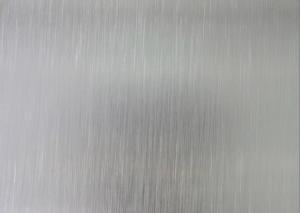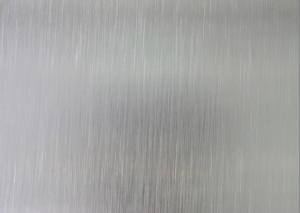PE Coated Embossed Aluminium Coil AA8011
- Loading Port:
- China Main Port
- Payment Terms:
- TT or LC
- Min Order Qty:
- -
- Supply Capability:
- -
OKorder Service Pledge
OKorder Financial Service
You Might Also Like
1.Structure of Product Description
PE Coated Embossed aluminium coils are widly used in decoration field, especially in Africa. For the period, it depends on the using evironment. If you use in the open air, it can remain 5-10 years.. If you use in the room, we recommend PE coated aluminium coils. The price is much more competitive.
2. Main features of the product
a.Competitive price---We have our own mills and can produce mill finished aluminium coils, so we can control the production cost better.
b.Professional after-sale service---We have more than 15 years exportation experience and you need not worry about the exporation problems.
c.Fast delivery time---We can control the delivery time within 35 days.
3. Image
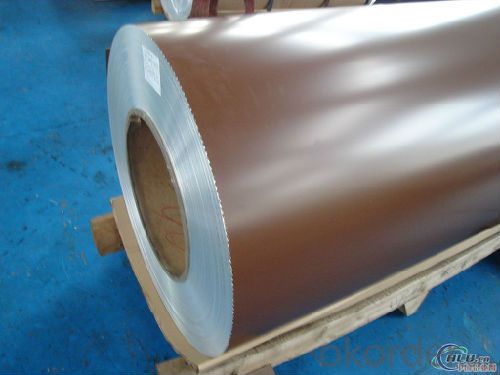
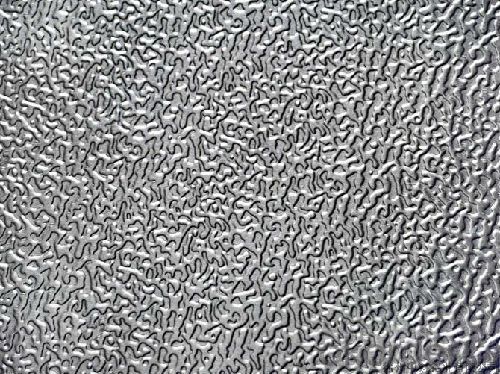
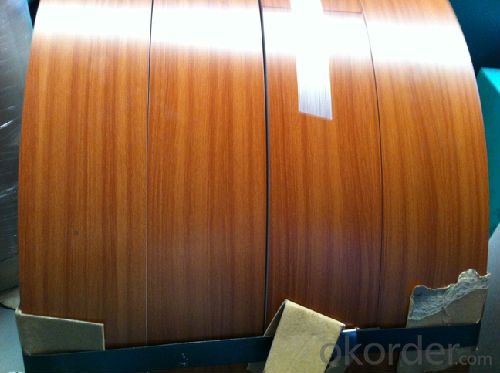
4.Products Specification
| Alloy | Temper | Thickness | Coil Weight | Coil ID |
| AA8011 | H18 | 0.2-0.5MM | 2 tons | 508mm+/-10mm |
5. FAQ:
What is the quality standard?
---Usually our standard is GB3880-2006
What is the largest width?
---It is 2300mm
What is the MOQ?
---Usually we can accept 80 tons.
- Q:How do aluminum coils contribute to lightweight transportation?
- Aluminum coils contribute significantly to lightweight transportation due to their inherent properties and versatile applications. Firstly, aluminum is a lightweight material itself, with a density one-third that of steel. This makes it an ideal choice for constructing various components of transportation vehicles such as cars, airplanes, and trains. When it comes to manufacturing aluminum coils, they are typically produced through a continuous casting and rolling process, resulting in a coil shape that is easy to transport and handle. These coils can be further processed into sheets, plates, or other forms, depending on the specific requirements of the transportation industry. The lightweight nature of aluminum coils offers several advantages for transportation. Firstly, it reduces the overall weight of the vehicle, leading to improved fuel efficiency and reduced emissions. Lighter vehicles require less energy to move, resulting in cost savings and environmental benefits. Additionally, the reduced weight allows for increased payload capacity, enabling transportation companies to carry more goods or passengers without exceeding weight limitations. Furthermore, aluminum coils possess excellent corrosion resistance, ensuring the longevity of transportation vehicles even in harsh environments. This durability reduces maintenance and replacement costs, making aluminum an economically viable choice for lightweight transportation. Moreover, aluminum coils offer excellent formability and can be easily shaped into different designs, allowing manufacturers to create aerodynamic structures that further enhance fuel efficiency. This flexibility in design enables the production of vehicles with reduced drag and improved performance, contributing to lightweight transportation. In conclusion, aluminum coils play a crucial role in lightweight transportation by providing a lightweight, durable, and corrosion-resistant material. Their utilization in various transportation components helps reduce overall vehicle weight, improve fuel efficiency, increase payload capacity, and enhance aerodynamics. As the transportation industry continues to prioritize sustainability and efficiency, aluminum coils will continue to play a significant role in achieving these goals.
- Q:What are the different coil recoiling options available for aluminum coils?
- There are several coil recoiling options available for aluminum coils, depending on the specific requirements and desired outcomes. One option is the oscillate recoiling method, which involves winding the aluminum coil in a zigzag pattern. This technique helps to reduce coil set and improve flatness, making it suitable for applications where a flat, smooth surface is crucial. Another option is the traverse winding method, which involves winding the aluminum coil back and forth in a controlled manner. This technique helps to evenly distribute the tension across the coil, reducing the risk of coil breaks and ensuring consistent performance. Additionally, there are options for coil slitting and rewinding. Slitting involves cutting the aluminum coil into narrower strips, which can be rewound into smaller coils. This option is commonly used when smaller coil sizes are required for specific applications. Furthermore, some recoiling options include coil rewinding with tension control systems. These systems ensure that the tension applied during rewinding is controlled and consistent, helping to prevent overstretching or deformation of the aluminum coil. Overall, the choice of coil recoiling options for aluminum coils depends on factors such as the desired surface finish, coil size requirements, and specific application needs. Manufacturers and processors of aluminum coils can provide guidance and expertise in selecting the most suitable recoiling option based on these considerations.
- Q:What are the different coil handling options available for aluminum coils?
- Aluminum coils have several options for handling, depending on the user's preferences and specific requirements. Some commonly used options include: 1. Coil Cradles: These are horizontal racks or frames that provide support and stability for aluminum coils during storage or transportation. They come in various sizes and designs to accommodate different coil dimensions. 2. Coil Cars: These mobile platforms have lifting mechanisms to easily move aluminum coils between different processing stations. They can be manually operated or automated, depending on the desired level of automation. 3. Coil Turnstiles: These rotating devices hold multiple coils vertically, allowing for easy access to individual coils without heavy lifting or rearranging. They are ideal for high-volume production environments that require quick coil changeovers. 4. Coil Upenders: Specialized equipment used to rotate or flip aluminum coils to change their orientation. They are useful for loading or unloading coils in a vertical position or for specific processes that require a particular coil orientation. 5. Coil Lifters: Specifically designed lifting devices for aluminum coils. They have adjustable arms or clamps to securely grip the coil for safe and efficient lifting. Available in manual, semi-automatic, and fully automated models. 6. Coil Tippers: Used to tilt or incline aluminum coils for various purposes such as coil feeding or inspection. They can be operated manually or powered by hydraulic or pneumatic systems. 7. Coil Stackers: Used to neatly stack and store aluminum coils vertically. They have adjustable arms or forks to accommodate different coil sizes, optimizing storage space and ensuring easy access when needed. These examples showcase the variety of coil handling options available for aluminum coils. Each option has its own advantages and suitability for different applications or industries. Careful consideration of specific requirements and constraints is essential when selecting the most appropriate coil handling solution.
- Q:How are aluminum coils tested for mechanical properties?
- To evaluate the mechanical properties of aluminum coils, a range of standardized tests are conducted. These tests assess factors such as strength, ductility, and other relevant properties. Tensile testing, hardness testing, and bend testing are among the common methods used. Tensile testing is widely employed to analyze the mechanical properties of aluminum coils. This method involves subjecting a small portion of the coil to a pulling force until it fractures. Throughout the test, the force and elongation are measured to determine the coil's ultimate tensile strength, yield strength, and elongation at break. Another crucial evaluation method is hardness testing, which measures the coil's resistance to indentation or scratching. This test provides insights into the coil's ability to withstand external forces. Different hardness testing techniques, such as Brinell, Rockwell, and Vickers, can be utilized based on specific requirements. Bend testing is performed to evaluate the coil's ductility and formability. This process entails bending the coil to a specific angle or radius and inspecting it for any indications of cracking, wrinkling, or defects. Bend testing helps determine the coil's ability to undergo forming processes without failure. In addition to these standard tests, specialized testing methods can be employed to assess mechanical properties like fatigue resistance, impact resistance, and fracture toughness. These tests offer valuable information about the performance of the aluminum coil and ensure that it meets the required specifications and standards. In conclusion, a combination of tests is utilized to comprehensively evaluate the mechanical properties of aluminum coils, guaranteeing that they possess the necessary strength, ductility, and other properties essential for their intended applications.
- Q:What are the typical mechanical properties of aluminum coils?
- The mechanical properties of aluminum coils can vary depending on the specific alloy and temper of the material. However, some typical mechanical properties of aluminum coils include: 1. Tensile strength: Aluminum coils generally have a high tensile strength, which refers to the maximum amount of tensile stress a material can withstand before it breaks. This property is important for applications that require the material to withstand heavy loads or stress. 2. Yield strength: Yield strength is the amount of stress a material can withstand without permanently deforming. Aluminum coils typically have a relatively high yield strength, allowing them to maintain their shape and structural integrity under normal operating conditions. 3. Elongation: Elongation refers to the amount a material can stretch or deform before it fractures. Aluminum coils typically have a relatively high elongation, making them suitable for applications that require the material to be formed or bent without breaking. 4. Hardness: The hardness of aluminum coils can vary depending on the alloy and temper. Aluminum alloys can be heat-treated to increase their hardness, making them more suitable for applications that require wear resistance or need to withstand harsh environments. 5. Fatigue strength: Fatigue strength is the ability of a material to resist the formation and growth of cracks under cyclic loading conditions. Aluminum coils generally exhibit good fatigue strength, making them suitable for applications subjected to repeated or fluctuating loads. It is important to note that these properties can vary depending on the specific alloy, temper, and processing conditions of the aluminum coils. Therefore, it is recommended to consult the material specifications or contact the manufacturer for more accurate and detailed information on the mechanical properties of specific aluminum coils.
- Q:How are aluminum coils protected against oxidation during storage?
- There are various methods used to protect aluminum coils against oxidation during storage. One commonly used approach involves applying a protective coating to the surface of the coils. This coating creates a barrier that prevents oxygen from coming into contact with the aluminum and causing oxidation. The coating may consist of a thin layer of oil or a specialized protective film. Another method involves storing the coils in a controlled environment with low humidity. This is because moisture in the air can accelerate the oxidation process. By keeping the coils in a dry environment, the risk of oxidation can be reduced. Furthermore, aluminum coils can be stored in airtight packaging, such as plastic wraps or vacuum-sealed bags. This further minimizes exposure to oxygen, thereby preventing oxidation. It is crucial to handle the coils with care during storage to avoid any damage that could potentially expose the aluminum to the air. Proper packaging and stacking techniques are essential to ensure that the coils remain protected. In conclusion, a combination of protective coatings, controlled environments, and proper handling techniques are employed to safeguard aluminum coils against oxidation during storage.
- Q:Can aluminum coils be used for food storage containers?
- Yes, aluminum coils can be used for food storage containers. Aluminum is a popular choice for food storage containers due to its many beneficial properties. It is lightweight, durable, and has excellent thermal conductivity, meaning it can evenly distribute heat for efficient cooking or cooling. Additionally, aluminum is non-toxic, odorless, and resistant to corrosion, making it a safe option for storing food. It also provides an effective barrier against light, moisture, and oxygen, which helps to preserve the freshness and quality of the stored food. Overall, aluminum coils can be a reliable and practical choice for food storage containers.
- Q:Can aluminum coils be used in automotive heat shields?
- Yes, aluminum coils can be used in automotive heat shields. Aluminum is a commonly used material in the manufacturing of heat shields due to its excellent heat resistance and lightweight properties. Aluminum coils can be formed and shaped into the desired design, allowing for easy installation and customization in automotive applications. Additionally, aluminum has high thermal conductivity, which helps to dissipate heat effectively, making it an ideal choice for heat shields in vehicles.
- Q:How are aluminum coils tested for surface roughness?
- Aluminum coils are tested for surface roughness using various methods to ensure they meet the required quality standards. One commonly used method is the use of a surface roughness tester or profilometer. This instrument measures the roughness of the coil surface by running a stylus or probe across the surface and recording the variations in height. The surface roughness tester provides data such as Ra (average roughness), Rz (average peak-to-valley roughness), and Rt (total height roughness). These parameters help assess the surface quality of the aluminum coil and determine if it meets the desired specifications. Additionally, visual inspection is often conducted to detect any visible defects, scratches, or irregularities on the surface. This inspection can be done manually by trained operators or with the assistance of automated systems that use cameras and image analysis algorithms to detect imperfections. Another method used to evaluate surface roughness is the use of laser scanners. These scanners emit laser beams that reflect off the surface of the aluminum coil and are then measured to determine the surface profile and roughness. Laser scanners provide high-resolution, non-contact measurements, making them highly accurate and efficient for assessing surface roughness. Overall, a combination of surface roughness testers, visual inspection, and laser scanners are commonly employed to test the surface roughness of aluminum coils, ensuring they meet the required quality standards for various applications.
- Q:Can aluminum coils be used for outdoor applications?
- Yes, aluminum coils can be used for outdoor applications. Aluminum is highly resistant to corrosion and weathering, making it a suitable choice for outdoor use. Additionally, aluminum coils are lightweight, durable, and have excellent thermal conductivity, making them ideal for various outdoor applications such as roofing, gutters, and HVAC systems.
1. Manufacturer Overview |
|
|---|---|
| Location | |
| Year Established | |
| Annual Output Value | |
| Main Markets | |
| Company Certifications | |
2. Manufacturer Certificates |
|
|---|---|
| a) Certification Name | |
| Range | |
| Reference | |
| Validity Period | |
3. Manufacturer Capability |
|
|---|---|
| a)Trade Capacity | |
| Nearest Port | |
| Export Percentage | |
| No.of Employees in Trade Department | |
| Language Spoken: | |
| b)Factory Information | |
| Factory Size: | |
| No. of Production Lines | |
| Contract Manufacturing | |
| Product Price Range | |
Send your message to us
PE Coated Embossed Aluminium Coil AA8011
- Loading Port:
- China Main Port
- Payment Terms:
- TT or LC
- Min Order Qty:
- -
- Supply Capability:
- -
OKorder Service Pledge
OKorder Financial Service
Similar products
New products
Hot products
Hot Searches
Related keywords
